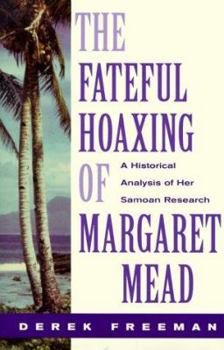The Fateful Hoaxing of Margaret Mead: A Historical Analysis of Her Samoan Research
Select Format
Select Condition 
Book Overview
For most of the twentieth century, Margaret Mead's renowned book Coming of Age in Samoa has validated an antievolutionary anthropological paradigm that assumes that culture is the overwhelming determinant of human behavior. Her account of female adolescent sexuality in Samoa initiated a career that led to Margaret Mead becoming "indisputably the most publicly celebrated scientist in America." But what if her study wasn't all it appeared to be? What if, having neglected the problem she had been sent to investigate, she relied at the last moment on the tales of two traveling companions who jokingly misled her about the sexual behavior of Samoan girls? What if her famous study was based on a hoax?In The Fateful Hoaxing of Margaret Mead, Derek Freeman addresses these issues in a detailed historical analysis of Margaret Mead's Samoan researches and of her training in New York by Franz Boas and Ruth Benedict. By examining hitherto unpublished correspondence between Mead, her mentor Franz Boas and others--as well as the sworn testimony of Fa'apua'a Fa'am, one of Mead's traveling companions of 1926--Freeman provides compelling evidence that one of the most influential anthropological studies of the twentieth century was unwittingly based on the mischievous joking of the investigator's informants.But The Fateful Hoaxing of Margaret Mead goes beyond a historical account of how the hoax took place; it is an examination of how Mead's Boasian training set her up to be hoaxed--and set others up to accept her conclusions. The book is more than a correction of scientific error: It is a crucial step toward rethinking the foundations of social science and the overly relativistic worldview of much of the modern world.
Format:Hardcover
Language:English
ISBN:0813335604
ISBN13:9780813335605
Release Date:October 1998
Publisher:Basic Books
Length:304 Pages
Weight:1.40 lbs.
Dimensions:1.0" x 6.3" x 9.3"
Age Range:13 years and up
Grade Range:Grade 8 and higher
Customer Reviews
5 ratings
Science & Scientist
Published by Thriftbooks.com User , 19 years ago
Being a researcher myself, I really appeciate this book by Freeman. Though I know little about anthropology, it is not difficult to be convinced that Mead's work in Samoa was deeply flawed. We all make mistakes. It's just Mead became quite famous, seemly benefiting rather than paying for the mistake. On the hand, I trust that Mead knew the problem in her research at least to some extent and must had suffered from this knowledge.
Innings in the nature/nurture debate
Published by Thriftbooks.com User , 22 years ago
Although this book smacks of comeuppance in the nature/nurture wars,with Freeman somewhat preditorily showing an excessive ... factor with his prey, it is interesting reading nonetheless, as it shows indirectly the whole dilemma of fieldwork, with its question mark, how observe another culture at all. The account of the genesis of Coming of Age in Samoa is convincing, although the issue of the hoaxing of Mead as to the actual facts of this coming of age remains slightly ambiguous. But the overall account suggests that the entire project was a bit thin in substance, of excessively short duration, and a prime example of prior assumptions influencing results. It is also a story of how our theories end up influencing our present, which is a challenge to our claims on science. The influence of this book on general culture is therefore a considerable irony. I think Freeman is on guard, hence his account stands up fairly well, but I would also check the challengers here, to this, and to the previous work on this subject by the author. In fact, what is the basis for any claim to observe another culture? Not via tourist photography, in any case.
Don't Shoot the Messenger
Published by Thriftbooks.com User , 24 years ago
One doesn't have to like Freeman to acknowledge that he's made his case and it holds up. It's wickedly ironic that Meade's shoddy reasearch (I don't think she was dishonest) was embraced as truth for fifty years. Anthropologists are supposed to explain myths, not create them. In a way it doesn't matter. The subject is old and Meade's reputation as a popularizer isn't changed one whit (but then the same could be said for Kinsey and Dr. Joyce Brothers). If Freeman had started his career with this book he would be justly regarded as a giant killer. As he's ending with this one he deserves his day. Well done.
The book rings true because it accords with prior evidence.
Published by Thriftbooks.com User , 26 years ago
Derek Freeman's book caught my eye because I had been told similar things about Margaret Mead's research by a trusted Samoan friend several years ago. He told me that he once had a radio talk show in American Samoa and he was able to interview several of the women who, as young girls, had served as the source for Mead's information. As I recall it, they told him that they had noticed that Mead seemed to want to hear stories of their loose sexual behavior, and they simply gave her lots of what she wanted. Putting this story over on Mead, he said, seemed to be a great source of merriment to the girls.I don't think the Samoan friend is putting one over on me. Should any serious researchers want to interview him (He lives in the Washington, DC, area), I would be glad to arrange the contact.
Don't shoot the messenger
Published by Thriftbooks.com User , 26 years ago
It's hard to accept that an cultural icon was once a brilliant yet gullible young woman or that a vaunted paradigm of Anthropology is fatally flawed. This book contrary to ad hominem attackers of Freeman tells the story with a compelling and accurate history of Mead' researches. You won't be able to put it down (literaly or figuratively) or stop thinking of its implications.





